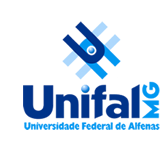The Information Technology Center (NTI) is responsible for the Information and Communication Technology (ICT) infrastructure at UNIFAL-MG, providing Information Technology (IT) services to administration, teaching, research and extension.
Logical Network
UNIFAL-MG currently has a fiber optic connection from the National Education and Research Network (RNP) in all campuses. All buildings in use, with the exception of the Department of General Services (DSG) of the Santa Clara Educational Unit, receive connectivity through optical fiber.
Availability and Service Level Agreement
Currently, the Institution is concerned with issues related to the availability of ICT and ANS, from the original in English, Service Level Agreement (SLA). One of the needs identified in the ICT Development Plan is to keep UNIFAL-MG’s Datacenter safe, available and with storage and processing capacity compatible with the demand for ICT services necessary for teaching, research, extension and administration activities.
Similarly, the contingency plan and operating conditions work 24/7, as the objective of increasing the redundancy of services made available in the datacenter.
Information Security
The theme of information security has gained prominence and importance at UNIFAL-MG in recent years. Among directives and standards, the Information Security Policy (PSI) in force, approved by CONSUNI, and also the existence of the Security Incident Handling and Response Team (ETIR) stand out.
Information Systems
UNIFAL-MG is an institution with several academic and administrative units that have vital functions for the smooth running of the institution’s processes. These processes must work in an integrated and automated way. This automation takes place through the UNIFAL-MG Integrated Systems, where each system is a module supported by a solid IT infrastructure, making use of a single centralized database, without redundancy and shared among the relevant sectors.
UNIFAL-MG Integrated Systems have a standardized interface, accessible via the web, being accessed through a single username and password, from a unified screen. The use of integrated systems enabled the automation of various institutional processes such as renewing enrollments, preparing and approving teaching programs, offering optional subjects, issuing ordinances, offering student assistance, submitting and evaluating extension and scientific initiation projects, events, shopping, among others. The main Integrated Systems are Academic, CAEX (Extension), Gpesq (research), People Management, Purchasing, among others.
SOURCE: NTI/UNIFAL-MG
